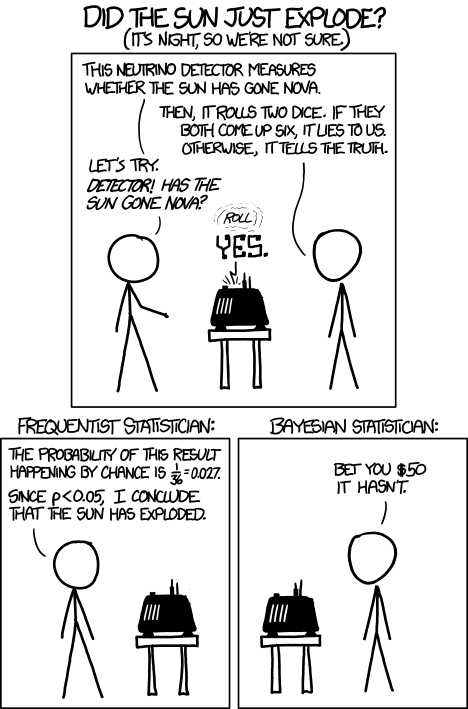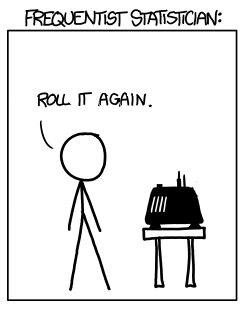A few people have noted that I hardly ever write about probability theory, despite the title of my blog. Have it your way, then, let’s talk probability theory. In An Introduction to Probability Theory and Its Applications, William Feller wrote the following in explication of the frequentist interpretation of probability:
There is no place in our system for speculations concerning the probability that the sun will rise tomorrow. Before speaking of it we should have to agree on an (idealized) model which would presumably run along the lines “out of infinitely many worlds one is selected at random…” Little imagination is required to construct such a model, but it appears both uninteresting and meaningless.
This is a fairly frank admission of the inability of frequentism to cope with the sunrise problem, a probabilistic conundrum which has been brought to the attention of the author of xkcd:

I am now going to kill the humor by picking this apart a bit. Frequentism is the notion that probability must be defined in terms of the frequency of an event over a large number of trials. Bayesianism, by contrast, tends to see probability in terms of background knowledge. The joke here is that the frequentist will take an unreasonably inflexible approach to statistical hypothesis testing, whereas the Bayesian will incorporate our background knowledge that the sun has risen every day for billions of years and (somewhat more importantly) that stars of the same age, size, and chemical composition as ours have no known physical mechanism by which to go nova in and of themselves.
The conflict illustrated above isn’t between those two schools of thought in general, but rather between their preferred methods of hypothesis testing, p-values from the frequentists versus the Bayesian calculation of posterior probability. The punchline almost works, but I’m pretty sure no self-respecting frequentist is going to let an experiment end at n=1, since fundamental frequentist doctrine requires a large number of experimental trials before they will even consider the possibility of calculating a probability. Accordingly, I submit to you a fourth panel for your consideration:
Make that the fourth, fifth, and sixth panel. And so on. If you can get to a sample size n=20 without any negative responses from the machine, it’s time to call for outside help. Either your neutrino detector has been woefully miscalibrated, or else the world is about to end.

